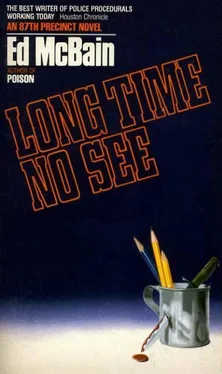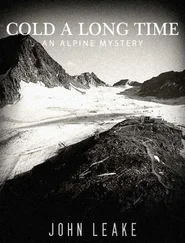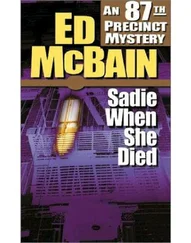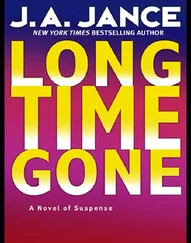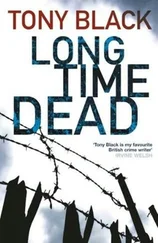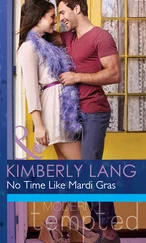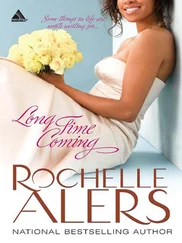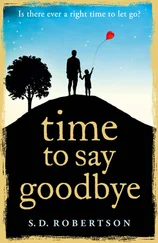“Mrs. Harris,” Carella said, “did your son and daughter-in-law have many friends?”
“Some, I believe.” Still the phony speech. Carella guessed she would use the word “quite” within the next several sentences. “Quite” was a sure indication that someone was using language he or she did not ordinarily use.
“Would you know their names?”
“I did not know any of their friends personally.”
“Did they ever talk bitterly about any of them?”
“No, I never heard them say anything nasty about anyone.”
“Would you know if they’d argued recently with—”
“I believe they got along quite well with everyone.”
“What we’re trying to find out is whether anyone—”
“Yes, I know. But you see... they were blind.”
Again the blindness. Again the blindness as a reason for denying the fact that they’d both been murdered. They were blind, therefore they could not have been brutally slain. But they had been.
“Mrs. Harris,” Carella said, “please try to think beyond their blindness. I know it’s difficult to believe anyone would harm two helpless—”
“But someone did,” Mrs. Harris said.
“Yes. That’s exactly my—”
“Yes,” she said.
“Who, Mrs. Harris? Can you think of anyone at all who might have wanted to harm them?”
“No one.”
“Were there any problems either of them were having? Did Jimmy or your daughter-in-law ever come to you for advice of a personal nature?”
“No, never.”
“Were they happy together, would you say?”
“They seemed very happy.”
“Did Jimmy have another woman?”
“No.”
“You’re sure?”
“I would have heard about it.”
“How about Isabel?”
“She was devoted to him.”
“Did they visit you often?”
“They came at least once a month. And on holidays, Christmas Thanksgiving — they were supposed to come here next week. I already ordered the turkey,” she said. “Ten pounds. There was going to be six of us — Jimmy and his wife, my daughter Chrissie and her boyfriend, and a man’s been coming around to see me.” Her speech had suddenly changed. Talk of the Thanksgiving holiday next week, of the homely preparations for it, had jerked her back into her own familiar speech pattern. These two white detectives might not be able to understand or to share her blackness, but at least they understood Thanksgiving. White or black, in America everyone understood turkey drumsticks and pumpkin pie, sweet potatoes and a word of grace.
“When they came to visit—”
“Yes,” she said, and nodded. She was thinking they would not come to visit ever again. The knowledge was plain on her face; it turned her amber eyes to ashes.
“Did anyone in the neighborhood comment about the nature of their marriage?”
“What do you mean?”
“That she was white.”
“No. Not to me, anyway. I guess there were some figured Jimmy had no cause marryin a white girl. But they wouldn’t dare say nothing to me about it.”
“How did you feel about it, Mrs. Harris?”
“I loved that girl with all my heart.”
“Did you know you’re the contingent beneficiary of your son’s insurance policy?”
“After Isabel, yes,” she said. “The second beneficiary.” She shook her head. “Bless their hearts,” she said.
“Twenty-five thousand dollars,” Carella said, and watched her.
“Bless their hearts,” she said again.
“Mrs. Harris,” Carella said, “this man you say you’ve been seeing... may I ask you his name?”
“Charles Clarke.”
“How long have you known him?”
“About six months.”
“How serious is your relationship?”
“Well... he’s asked me to marry him.”
“Have you accepted?”
“No. Not yet.”
“Do you think you might marry him?”
“I might.”
“Have you told him this?”
“I told him maybe after Chrissie was out of the house. She’s about to get married herself next year, the weddin’s set for June, that’s when her boyfriend’ll be graduating high school.”
“How old is she?” Carella asked.
“Chrissie’s seventeen.”
“And you told Mr. Clarke you might marry him in June?”
“After Chrissie’s out of the house, yes.”
“What’d he think about that?”
“Well, he’s in a hurry, same as any man.”
“What sort of work does he do?”
“He’s a fight manager.”
“Who does he manage?”
“Fighter named Black Jackson. You ever hear of him?”
“No, I’m sorry.”
“He fights at St. Joe’s all the time. St. Joseph’s Arena.”
“Mrs. Harris,” Carella said, “I hope this won’t offend you.” He hesitated. “Did you and Mr. Clarke ever discuss money?”
“Sometimes.”
“Did he know that you were the contingent beneficiary of a twenty-five-thousand-dollar insurance policy?”
“Yes.”
“You told him?”
“Jimmy did. He was talking about if anything should happen to him and Isabel, I’d be well taken care of. He had all to do to take care of hisself, but he was always worryin about me.” She looked directly into Carella’s eyes. “If you’re thinkin Charlie had anything to do with killing my boy and his wife, you’re dreaming, mister.”
“We’d like to talk to him, anyway,” Carella said.
“You can talk to him if you like, he lives right around the comer on Holman, 623 Holman. But it wasn’t Charlie who killed them. You ask me...”
“Yes, Mrs. Harris?”
“It must’ve been somebody crazy,” she said. “It had to be somebody crazy.”
Well, maybe it had been somebody crazy.
The city was full of bedbugs, true enough, and whereas they usually surfaced during the hot summer months, there was no law that said a lunatic couldn’t come out of the woodwork in the middle of November and kill two helpless blind people. The trouble with the crazies of the world, however, was exactly that: they were crazy. And with crazy people, you couldn’t go looking for reasons, you couldn’t start thinking about motives. With crazies, you just went along on the theory that maybe you’d stumble over a solution somehow, maybe the guy would go berserk in a crowded restaurant and you’d arrest him and he’d confess to having killed sixty-four blind people in the past month, all in different cities. One of them in London. There were a lot of crazies on television cop shows, the network reasoning being that the home viewer felt more content watching a show where a nut was doing all the killing, instead of a nice sane person with a motive, just like you or me. Crazies made very soothing killers. They were not much fun to track down, however, since there was no place to start and no place to go. All you could do was hope, and hope is the thing with feathers.
So they went to see Charlie Clarke, who at least had a possible reason for wanting Jimmy and Isabel Harris out of the way. In the land of the blind, and so on. And in the absence of any solid suspects, you grabbed for the nearest floating straw, hoping it would take on the dimensions of a lifeboat or a log.
The building on Holman was similar to the one in which Sophie lived. Lettered in white paint on successive risers of the front stoop were the warnings No Loitering and No Stoop Ball. They went into the outer lobby, where a row of broken mailboxes was on the walk to their left. There was a nameplate for Charles C. Clarke in the box for apartment 22. The upper half of the inner-lobby door was a piece of frosted glass that had a crack running diagonally across it from the lower left-hand comer to the upper right. The door was unlocked. The ground-floor landing stank of piss and wine. There were no lights. Carella turned on his flash, and together they climbed the steps.
Читать дальше
